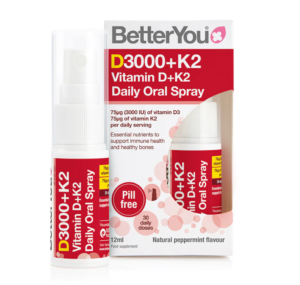Lifestyle
How do I know if I’m low in vitamin D?
There’s always a lot of chat about vitamin D, especially as the chillier, darker months arrive. So how do you know if you’re low in this crucial vitamin?
Here, we explain what vitamin D is, why it’s so important and the symptoms you might encounter from low vitamin D levels.
What is vitamin D?
Our bodies naturally create vitamin D when we expose our skin to UVB radiation from the sun.
Vitamin D has many jobs throughout the body but is commonly known for its contribution to bone health. It promotes calcium absorption in the gut to maintain calcium and phosphate concentrations, which ensure healthy, strong bones and teeth.
It’s also key to a healthy immune system – vitamin D triggers immune cells to create antibodies and assists in reducing inflammation in the body.
Who is most likely to have low levels?
For those of us living in the northern hemisphere, sunlight exposure is limited throughout the winter months and we’re more susceptible to vitamin D deficiency during this time.
If you have dark skin – for example you have an African, African-Caribbean or south Asian background – you may not be exposed to enough UVB radiation to make enough vitamin D from sunlight.
Plus, if you spend a lot of time indoors, this limits your exposure to sunlight and ability to create vitamin D.
What symptoms come with low vitamin D levels?
Common symptoms of low vitamin D levels might include:
- Being more susceptible to coughs and colds
- Struggling to heal wounds
- Bone, muscle and back pain
- Fatigue or tiredness, which can lead to symptoms of low mood and depression
How can I increase my intake?
Spending short periods daily in the sun with your forearms, hands or lower legs uncovered without sunscreen can boost your vitamin D. We don’t yet know exactly how much time we need to spend in the sun to meet requirements.
The amount of vitamin D your body makes depends on skin tone, geographical location and season. You also need to take care not to burn your skin.
Fish and seafood are other sources of vitamin D, with the NHS advising to eat at least two portions per week including one oily fish portion.
Egg yolks and some fortified foods also contain vitamin D. Bear in mind that you’d have to eat quite a lot of them to get your daily requirement and it can be easier to take a supplement.
Supplements for vitamin D can come in the form of tablets, capsules or – even easier – oral sprays.
Will I always need a vitamin D supplement?
Our body requirements change over time due to lifestyle, ageing and diet factors, so it makes sense that your vitamin D requirements will change too.
If you’re deficient in vitamin D, you’ll likely need additional supplementation for a time period to boost your levels.
In the northern hemisphere, we often don’t get the required levels of UV light all year round. The Government recommends taking a supplement during the winter months.
 We love BetterYou’s D3000+K2 supplement. This convenient daily oral vitamin D spray is formulated to combat vitamin D deficiency. It’s a natural aid to bone and teeth health and helps to support the immune system. Added K2 helps to support a healthy immune system, healthy bones and normal blood clotting.
We love BetterYou’s D3000+K2 supplement. This convenient daily oral vitamin D spray is formulated to combat vitamin D deficiency. It’s a natural aid to bone and teeth health and helps to support the immune system. Added K2 helps to support a healthy immune system, healthy bones and normal blood clotting.
Plus, you can save 15% off your order at BetterYou using the code LIZLOVES at checkout.
Read more related to this
- Everything you need to know about vitamin D
- Vitamins and minerals for the menopause
- Osteoporosis bone building exercises
Please note, on some occasions, we earn revenue if you click the links and buy the products, but we never allow this to bias our coverage and always honestly review. For more information please read our Affiliate Policy.





